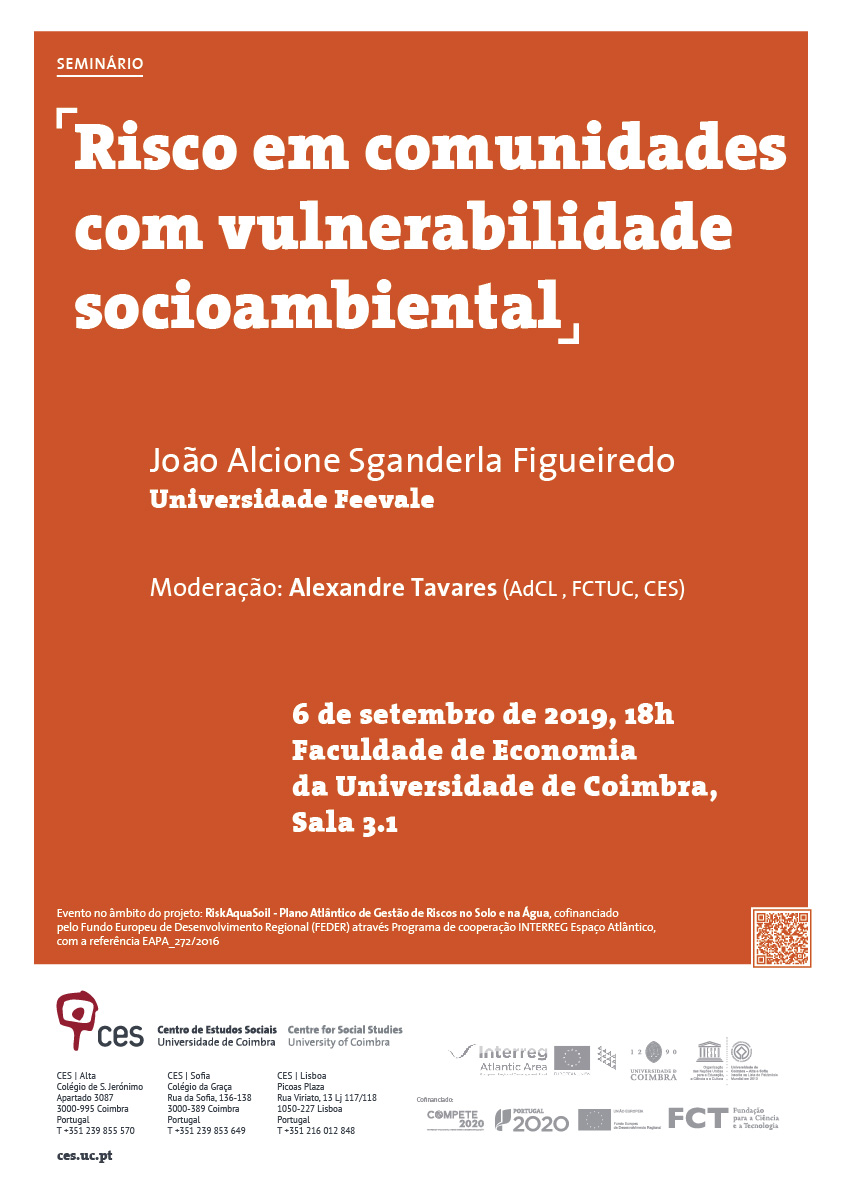Seminar
Risk in communities with social and environmental vulnerability
João Alcione Sganderla Figueiredo (Universidade Feevale)
September 6, 2019, 18h00
Seminar Room (Floor 2), CES | Sofia
Overview
We will discuss how environmental risk and health were and are constructed and how they are perceived by different actors, be them social, economic or political. The idea is to problematise environmental risk and its relationship with health as an element that is beyond the existing geopolitical limits. And at the same time, as we expand the scale, this allows us to explore other existing topologies about the idea of risk and to understand how it is built from diverse referents linked to how, within the environmental field, different interests are worked out, developed and made consensual in the light of its “media construction” due to the way it is presented to the public.
One of the main dilemmas is that, on the one hand, humanity challenges new discovered technologies, but, on the other hand, seeks mechanisms to control these technologies and their applicability. We outline here that the unbridled transformation of the planet, justified by the needs of industrial society, causes man's interaction with the environment to produce a suicidal outcome when he endangers natural resources. Added to this is the degradation of culture, driven by economic interests that prioritise the quality of life of a small portion of the population, while the vast majority of society lives in subhuman conditions. The question is: are knowledge, science and technology as a source of progress linked to the sustainable development process? Moreover, are scientific studies done in a fragmented manner sufficient to understand the processes of this situation and to seek solutions to political, economic and especially socio-environmental problems? What can be seen is that evaluations and private actions are not enough. Our dialogue proposes to unify different areas of science, seeking solutions to structural issues, through a discussion that can permeate the Human, Social, Applied, Nature, that is, interdisciplinary.
From this perspective, we also seek to understand how the idea of environmental and health risk is perceived and also how they perceive different environmental and social policies and risks that involve the implementation of public policies of diverse nature related specifically to the environment and health. Thus, the project intends to point out structuring paths to think and rethink what type of planning is being made regarding sanitation, housing, drinking water quality and leisure facilities, which culminate in a healthy environment; above all, to consider that the result posed here, by the perception of risk of the city residents and of the public power and its relation to the real risks, lead to the potential of a real channel of dialogue with new public policy propositions. Optimistically, we can say that this work can become a recipe for formatting and applying public policies for the environment and its relationship with health. In other words, we will focus on environmental impacts and health in the process of metropolis formation.
Moderator: Alexandre Tavares (AdCL Chairman of the Board; Associate Professor in the Department of Earth Sciences, Faculty of Science and Technology, University of Coimbra; Researcher at the Centre for Social Studies, University of Coimbra)
---
Event under the project: RiskAquaSoil - Plano Atlântico de Gestão de Riscos no Solo e na Água, cofinanced by the European Regional Development Fund (ERDF) through the INTERREG Atlantic Area Cooperation Programme, reference: EAPA_272/2016


